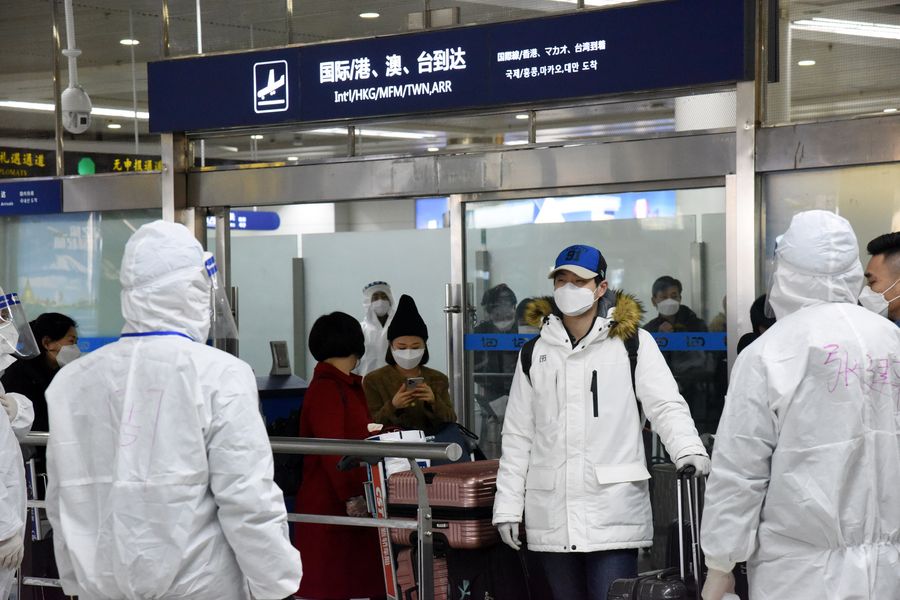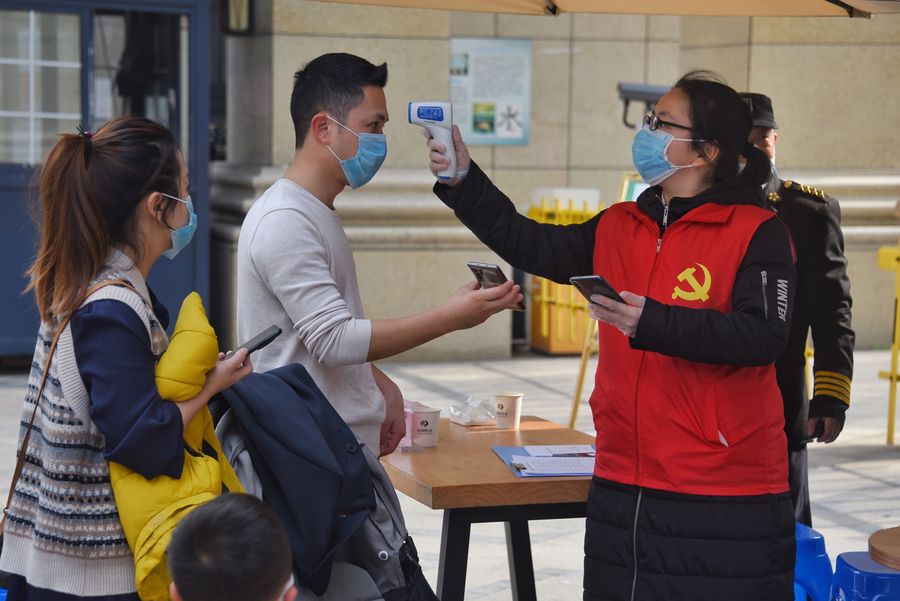While the novel coronavirus outbreak within China slows down, thanks to the sweeping measures put in place, alarming clusters of thousands of cases have turned up outside China. This has led to a surge in the number of imported cases. Therefore, China has taken a series of new steps to contain the reverse spread of the virus.
by Xinhua writers Yin Xiaosheng, Ma Yujie
HANGZHOU, March 6 (Xinhua) -- With swift and solid efforts taken across the country over the past weeks, China has seen good signs in the number of new infections of the novel coronavirus.
The main battlefield of Hubei Province reported no new infections outside its capital city Wuhan, the epicenter of the epidemic, in over 24 hours for the first time on Thursday. But the rising imported cases from overseas has become the latest concern.
On Thursday, a total of 17 new coronavirus cases were reported on the Chinese mainland outside Hubei, of which 16 were imported cases. This has brought the overall cumulative number of imported cases on the mainland to 36, according to the National Health Commission.

A staff member reminds foreigners to fill in an arrival card at Qingdao Liuting International Airport in Qingdao, east China's Shandong Province, March 5, 2020. (Xinhua/Li Ziheng)
East China's Zhejiang Province has reported 10 imported cases as of Thursday. Such cases have also been reported in Beijing, Shanghai, Gansu Province and Ningxia Hui Autonomous Region.
Health checks and quarantine measures have therefore been intensified for incoming travelers. For instance, Beijing and Shanghai municipalities, Shandong, Heilongjiang and Liaoning provinces have required all passengers from hard-hit countries to be quarantined for 14 days upon their arrival.
"Most of the inbound passengers are mainly returning overseas Chinese," said Peng Bo, deputy head of the leading group for epidemic prevention and control in Zhejiang.
"Information transparency is essential in epidemic control and prevention," said Peng, adding that they would be better prepared if the health status of inbound travelers could be shared in advance.

Arriving passengers wait in line at Qingdao Liuting International Airport in Qingdao, east China's Shandong Province, March 5, 2020. (Xinhua/Li Ziheng)
LESSON LEARNED
Earlier this month, eight people returned to Zhejiang's Qingtian County from Italy via Shanghai. They later tested positive for the novel coronavirus.
Local authorities traced a total of 383 close contacts as of March 3, none of which has developed fever or other respiratory symptoms.
Qingtian is known as the hometown of overseas Chinese who are scattered in more than 120 countries and regions. About 100,000 Qingtian natives are living in Italy.
As of Thursday, Italy had confirmed 3,296 cases of coronavirus infection and 148 fatalities, according to the country's Civil Protection Department coordinating the emergency task force.
"The epidemic has heavily impacted the daily lives of many overseas Chinese. Many would rather return home under such circumstances," said Zhou Yong, honorary president of the Qingtian chamber of commerce in Italy.
"We expect more Chinese to return home," he said.
Every year in mid-March, or around the Tomb-sweeping Day in early April, many overseas Chinese come back to celebrate their ancestors. The travel rush may arrive earlier because of the outbreak, according to staff with the overseas Chinese federation in Qingtian.
"We have been paying close attention to the overseas situation of the novel coronavirus outbreak and have taken active measures to secure the safety of every Qingtian resident at home and abroad," said Ye Juan, a local official.
"They are welcome back, and we will make proper arrangements for them," said Lian Xiaomin, chairman of the Zhejiang Federation of Returned Overseas Chinese.
Zhejiang alone has more than two million Chinese living overseas, over half of which are in Europe.
Lian said the federation also rolled out a service package for overseas Chinese, which includes psychological counseling, information on the novel coronavirus and briefings on China's anti-epidemic experience.
"We have also offered online medical consultation services for overseas Chinese," he said.

A volunteer checks a resident's body temperature at the entrance of a community in Qingtian County, east China's Zhejiang Province, March 1, 2020. (Xinhua/Yin Xiaosheng)
MUTUAL ASSISTANCE
China has been joining hands with the international community to fight COVID-19 by sharing information and donating medical supplies, among others.
The Chinese Foreign Ministry and National Health Commission on Tuesday held a video conference with health experts from Azerbaijan, Belarus, Georgia, Moldova, Armenia, Turkmenistan and the secretariat of the Shanghai Cooperation Organization to share China's anti-epidemic experience.
Vice Foreign Minister Ma Zhaoxu said that China has provided some countries with detection kits and donated anti-epidemic supplies through the Red Cross and other channels.
China would share information and experience in a timely manner, as well as coordinate policies and resources with other countries and the WHO to help win the global war against the epidemic, according to Foreign Ministry Spokesperson Zhao Lijian.
On Wednesday night, experts from Wuhan Tongji Hospital shared with doctors from the Nicuarda Hospital in Milan, Italy, their experience with treating novel coronavirus pneumonia patients via video conference.
In the one-hour exchange, Wuhan experts shared in detail the key points of prevention and control, the protective measures for medics and the Tongji treatment plans.

Medical supplies donated by local Chinese community to the emergency center in Piemonte, Italy, Feb. 28, 2020. (Photo by Wang Hongxia/Xinhua)
In the meantime, non-governmental organizations, including the Alibaba Foundation and Jack Ma Foundation, have donated medical supplies such as masks and traditional Chinese medicine to hard-hit regions.
"We have received tremendous help from many countries over the past month when we were in urgent need of supplies," said Jack Ma, founder of Alibaba, in an open letter. "We knew what we should do at that very moment."
(Fang Lie, Duan Jingjing, Yu Wan, Cui Li, Chen Lin contributed to the story)
(Video reporters: Wang Yiwen, Song Lifeng, Zheng Mengyu, Wang Huan, Feng Yuanyuan, Li Ziheng, Zhang Liyuan, Jiang Mingming; video editor: Zhao Xiaoqing) ■



